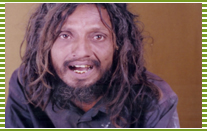|
|
| |
 |
INDIA
MENTAL HEALTH STATUS |
|
|
Mental disorders afflict 5 crore of
the Indian population (5%) and need special care. 80% of our
districts do not have even one psychiatrist in public service.
WHO estimates of 2001 indicate a
prevalence level of about 22% of individuals developing one or more
mental or
behavioral disorders in their lifetime in India.
|
 |
|
|
|
According to WHO countries like India devote
less than 1% of their health budget to mental health compared to 10%, 12%, 18%
in other countries.
There are just 3,500 psychiatrists in India. Three psychiatrists per one million
people in India, compared to 100 in Australia or 150 in developed countries.
Over 90% of people with mental illness are cared
for within their communities by their families and may never even receive a
diagnosis.
|
 |
THE
NATIONAL SERVICE CAPACITY |
|
PSYCHIATRIC BEDS AND PROFESSIONALS
|
 |
Total
psychiatric beds per 10 000 population 0.25
|
 |
Psychiatric beds in mental hospitals per 10 000
population 0.2
|
 |
Psychiatric beds in general hospitals per 10 000
population 0.05
|
 |
Psychiatric beds in other settings per 10 000
population 0.01
|
| |
|
 |
Number
of psychiatrists per 100 000 population 0.4
|
 |
Number
of psychiatric nurses per 100 000 population 0.04
|
 |
Number
of psychologists per 100 000 population 0.02
|
 |
Number
of social workers per 100 000 population 0.02
|
| |
|
 |
Number
of Mental hospitals 43 with a bed capacity of 20,000
|
|
Source WHO Country Profiles: India 2001 |
 |
THE PROBLEM WITH
SOCIETY |
|
|
Stigma and discrimination because of mental
illness are still major obstacles to the development of mental health services,
to the rehabilitation of those impaired by mental illness, and to an investment
into mental health research.
|
 |
NATIONAL HUMAN RIGHTS COMMISSION 1999 INVESTIGATIONS-INDIA |
|
|
“The findings reveal that there are
predominantly two types of mental hospitals," the report said. "The
first type do not deserve to be called 'hospitals' or mental health
centers. They are 'dumping grounds' for families to abandon their mentally ill
member, for either economic reasons or a lack of understanding and awareness of
mental illness. The living conditions in many of these settings are deplorable
and violate an individual's right to be treated humanely and live a life of
dignity. Despite all advances in treatment, the mentally ill in these hospitals
are forced to live a life of incarceration.”
|
|
The second kind …"are those
that provide basic living amenities. Their role is predominantly custodial
and they provide adequate food and shelter. Medical treatment is used to
keep patients manageable and very little effort is made to preserve or
enhance their daily living skills. These hospitals are violating the
rights of the mentally ill persons to appropriate treatment and
rehabilitation and a right to community and family life".
|

|
 |
THE MENTALLY ILL
DESTITUTE |
|
 |
Ironically it is in urban areas where medication
and psychiatrists are available, but in rural areas medication is
not available nor are psychiatrists.
|
 |
The primary health centers don’t stock
medication and huge populations of people with major mental illness
don’t have access to either treatment or to medication.
|
 |
However in a rural village a patient suffering from
schizophrenia, is assimilated within the culture without a lot of
discrimination. But when these villages become towns there is a
decreased tolerance to these psychiatric illnesses. Gender bias
aggravates problems.
|
 |
The joint family system had assimilated and
provided care for many of the mentally ill in their homes but with
increasing nuclear families, care provision demands more
resources.
|
 |
Thus India without a massive mental health movement will see a
lot of homeless
destitute patients.
|
|
|





